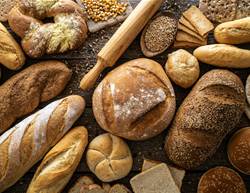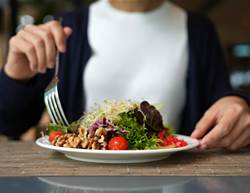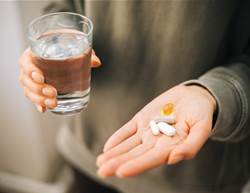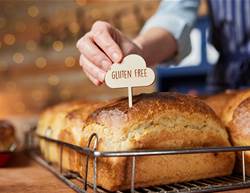It’s easy to see why Greek yoghurt belongs on the shopping list. That creamy mouthfeel, tick. Gut-friendly probiotics for easier digestion, tick. Rich in calcium for maintaining strong bones and teeth, tick. Low GI, meaning it is slowly digested for long-lasting energy, tick. But not all tubs are made equal, and let’s face it, sometimes plain yoghurt can seem a little drab, or taste too tart on its own. With so many to choose from, and hidden sugars to avoid, how do you separate a healthy container from the pack?
‘AUTHENTIC’ Vs ‘GREEK STYLE’?

How Greek yoghurt is made determines if it’s naturally thick and creamy, or has been made to appear that way, and trust us, your tastebuds can tell the difference! Authentic Greek yoghurt is made by fermenting milk and live probiotic cultures, then straining them to remove the liquid whey. What’s left behind are thick and creamy curds, which taste silky and satisfying without any added sugar. But if you buy a ‘light’ version then you’re trading down to a thin, watery version of the original. Why? Skimming the fat removes the creamy mouthfeel, which manufacturers then try to imitate with added thickeners and sugars (sometimes in the form of milk powders) to make it more palatable. The ingredients list reveals if this is the case, plus you’ll probably still feel hungry because this trimmed version is less satisfying.
The bottom line: don’t skimp on quality. Keywords to look for on the label are ‘Greek’, ‘authentic’ and ‘strained’, which hints it’s the real deal, but always scan the ingredients list: the more simplicity (milk plus live probiotic cultures), the better.
Next, focus on spooning out a healthy portion, about 200g, (or 600 kilojoules/144 calories). Some single-serve packs have much more so it pays to check the portion size on the pack. Then add your own d-i-y flavour combo; fresh fruit, berries, chopped nuts, seeds, honey and cinnamon. Yum!
5 OF THE BEST IN SUPERMARKETS
The following products are as authentic as they come, made with minimal ingredients. And with our nutritional analysis, you can easily compare like with like:
Chobani Plain Greek Yogurt – 0.5%

Nutrition per 100g: 240 kJ/57 cal.
- Protein 9.7g.
- Total fat 0.2g.
- Sat fat 0.1g.
- Carbs 4.2g.
- Sugars 3.3g.
- Calcium 120mg.
Evia Greek Strained Yoghurt – Natural

Nutrition per 100g: 504 kJ/121 cal.
- Protein 9.6g.
- Total fat 7.0g fat.
- Sat fat 4.4g.
- Carbs 4.8g.
- Sugars 2.3g.
- Calcium 105mg.
Meredith Dairy Natural Sheep Milk Yoghurt - Traditional Greek

Nutrition per 100g: 387 kJ/93 cal.
- Protein 5.7g.
- Total fat 6.0g.
- Sat fat 4.2g.
- Carbs 4.0g.
- Sugars 3.1g.
- Calcium 183mg.
Jalna Greek Yoghourt – Low Fat

Nutrition per 100g: 423 kJ/101 cal.
- Protein 5.7g.
- Total fat 3.0g.
- Sat fat 1.9g.
- Carbs 8.3g.
- Sugars 6.7g.
- Calcium 180mg.
Danone YoPRO Plain Yoghurt

Nutrition per 100g: 259 kJ/62 cal.
- Protein 10.6g.
- Total fat 0.2g.
- Sat fat 0.1g.
- Carbs 4.2g.
- Sugars 4.2g.
- Calcium 110mg.
Tasty Ideas To Try
- Stir yoghurt through warm porridge, curries or soups for a creamier flavour.
- Blend it into a savoury dip by adding dukkah with a splash of olive oil, or beetroot and chopped mint.
- Drizzle with honey and chopped walnuts and enjoy as a snack or dessert.
- Create a delicious dressing for chicken or lamb by mixing yoghurt with cumin, fresh herbs or lemon zest.
For more articles on nutrition from our Prevention experts, sign up to the weekly newsletter at preventionaus.com.au/newsletter.










